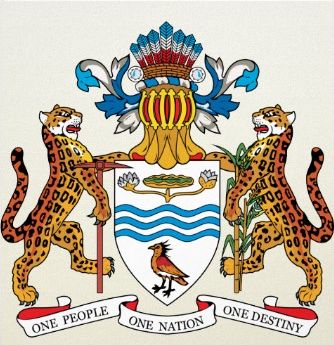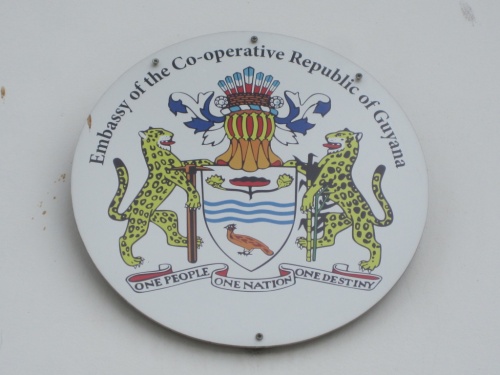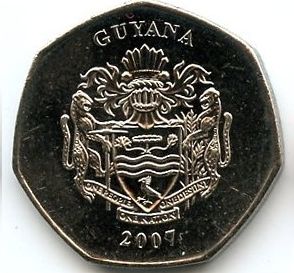National Arms of Guyana: Difference between revisions
Knorrepoes (talk | contribs) m (Text replacement - "====Origin/meaning====" to "===Origin/meaning===") |
Knorrepoes (talk | contribs) m (Text replacement - "====Official blazon====" to "===Official blazon===") |
||
| Line 9: | Line 9: | ||
[[File:Guyana.jpg|center|350 px|Arms (crest) of {{PAGENAME}}]] | [[File:Guyana.jpg|center|350 px|Arms (crest) of {{PAGENAME}}]] | ||
===Official blazon=== | |||
===Origin/meaning=== | ===Origin/meaning=== | ||
Revision as of 05:44, 23 June 2017
| Heraldry of the World Civic heraldry of Guyana |
NATIONAL ARMS OF GUYANA
Official blazon
Origin/meaning
The Guyanese Coat of Arms was selected on the recommendation of the National History and Arts Council and approved by the College of Arms, England. The House of Assembly accepted it on Friday, 25th February, 1966.
The Native American head-dress symbolises the Amerindians as the indigenous people of the country. The two diamonds at the side of the head-dress represent the country's mining industry. The helmet is the monarchical insignia. The two jaguars holding a pickaxe, a sugar-cane and a stalk of rice symbolise labour and the two main agricultural industries of the country - sugar and rice. The shield, which is decorated with the national flower, the Victoria Regia Lily, is to protect the nation. The three blue wavy lines represent the many waters of Guyana. The Canje Pheasant at the bottom of the shield represents a rare bird found principally in this part of the world.
The arms on the Embassy in Suriname (source) |
The arms on a coin |
Contact and Support
Partners:
Your logo here ?
Contact us
© since 1995, Heraldry of the World, Ralf Hartemink 
Index of the site
Literature : -













